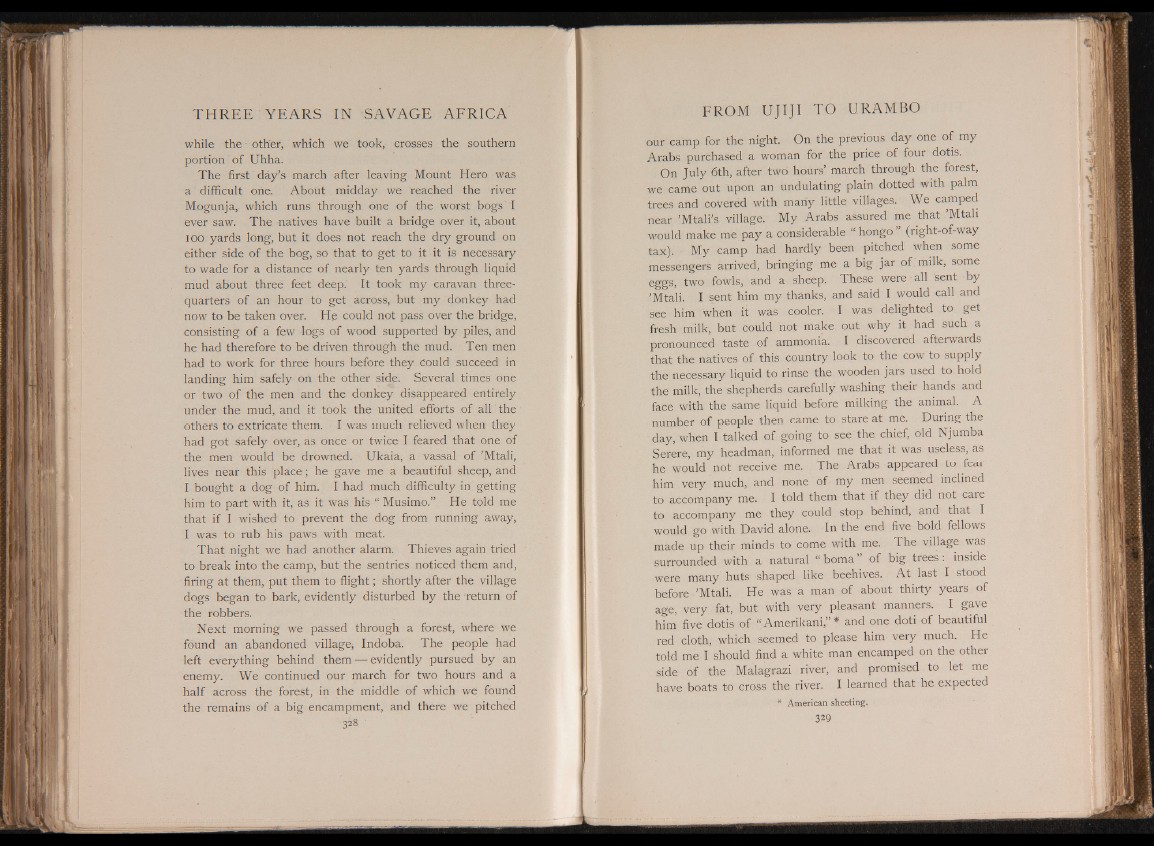
while the ■ other, which we took, crosses the southern
portion of Uhha.
The first day’s march after leaving Mount Hero was
a difficult one. About midday we reached the river
Mogunja, which runs through one of the worst bogs I
ever saw. The natives have built a bridge over it, about
100 yards long, but it does not reach the dry ground on
either side of the bog, so that to get to it it is necessary
to wade for a distance of nearly ten yards through liquid
mud about three feet deep. It took my caravan three-
quarters of an hour to get across, but my donkey had
now to be taken over. Hp could not pass over the bridge,
consisting of a few logs of wood supported by piles, and
he had therefore to be driven through the mud. Ten men
had to work for three hours before they Could succeed in
landing him safely on the other side. Several times one
or two of the men and the donkey disappeared entirely
under the mud, and it took the united efforts of all the
others to extricate them. I was much relieved when they
had got safely over, as once or twice I feared that one of
the men would be drowned. Ukaia, a vassal of ’Mtali,
lives near this place; he gave me a beautiful sheep, and
I bought a dog of him. I had much difficulty in getting
him to part with it, as it was his •“ Musimo.” He told me
that if I wished to prevent the dog from running away,
I was to rub his paws with meat.
That night we had another alarm. Thieves again tried
to break into the camp, but the sentries noticed them and,
firing at them, put them to flight; shortly after the village
dogs began to bark, evidently disturbed by the return of
the robbers.
Next morning we passed through a forest, where we
found an abandoned village; Indoba. The people had
left everything behind them — evidently pursued by an
enemy. We continued our march for two hours and a
half across the forest, in the middle of which we found
the remains of a big encampment, and there we pitched
328, '
our camp for the night. On the previous day one of my
Arabs purchased a woman for the price of four dotis.
On July 6th, after two hours’ march through the forest,
we came out upon an undulating plain dotted with palm
trees and covered with many little villages. We camped
near ’Mtali’s village. My Arabs assured me that ’Mtali
would make me pay a considerable “ hongo ” (right-of-way
tax). My camp had hardly been pitched when some
messengers arrived, bringing me a big jar of milk, some
eggs, two fowls, and a sheep. These were all sent by
’Mtali. I sent him my thanks, and said I would call and
see him when it was cooler. I was delighted to get
fresh milk, but could not make out why it had such a
pronounced taste of ammonia. I discovered afterwards
that the natives of this country look to the- cow to supply
the necessary liquid to rinse the wooden jars used to hold
the milk, the shepherds carefully washing their hands and
face with the same liquid before milking the animal. A
number of people then came to stare at me. During the
day, when I talked of going to see the chief, old Njumba
Serere, my headman, informed me that it was useless, as
he would not receive me. The Arabs appeared to fear
him very much, and none of my men seemed inclined
to accompany me. I told them that if they did not care
to accompany me they could stop behind, and that I
would go with David alone. In the end five bold fellows
made up their minds to come with me. The village was
surrounded with a natural “ boma of big trees: inside
were many huts shaped like beehives. At last I stood
before ’Mtali. He was a man of about thirty years of
age, very fat, but with very pleasant manners. I gave
him five dotis of “ Amerikani,” * and one doti of beautiful
red cloth, which seemed to please him very much. He
told me I should find a white man encamped on the other
side of the Malagrazi river, and promised to let me
have boats to cross the river. I learned that he expected
* American sheeting.
329